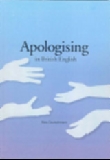Sökning: onr:2c7wb1tl0fj74ccz > Apologising in Brit...
- 1 av 1
- Föregående post
- Nästa post
- Till träfflistan
Apologising in British English [Elektronisk resurs]
- Deutschmann, Mats, 1964- (författare)
- Poussa, Patricia (preses)
- Nevalainen, Terttu (opponent)
- Umeå universitet Humanistiska fakulteten (utgivare)
- Publicerad: Umeå : Moderna språk, 2003
- Engelska 262
- Serie: Skrifter från moderna språk, 1650-304X 1650-304X
- Ingår i:
- E-bokAvhandling(Diss. Umeå : Umeå universitet, 2003)
Sammanfattning
Ämnesord
Inställningar
Hjälp
Stäng
- The thesis explores the form, function and sociolinguistic distribution of explicit apologies in the spoken part of the British National Corpus. The sub-corpus used for the study comprises a spoken text mass of about five million words and represents dialogue produced by more than 1700 speakers, acting in a number of different conversational settings. More than 3000 examples of apologising are included in the analysis. Primarily, the form and function of the apologies are examined in relation to the type of offence leading up to the speech act. Aspects such as the sincerity of the apologies and the use of additional remedial strategies other than explicit apologising are also considered. Variations in the distributions of the different types of apologies found are subsequently investigated for the two independent variables speaker social identity (gender, social class and age) and conversational setting (genre, formality and group size). The effect of the speaker-addressee relationship on the apology rate and the types of apologies produced is also examined. In this study, the prototypical apology, a speech act used to remedy a real or perceived offence, is only one of a number of uses of the apology form in the corpus. Other common functions of the form include discourse-managing devices such as request cues for repetition and markers of hesitation, as well as disarming devices uttered before expressing disagreement and controversial opinions. Among the speaker social variables investigated, age and social class are particularly important in affecting apologetic behaviour. Young and middle-class speakers favour the use of the apology form. No substantial gender differences in apologising are apparent in the corpus. I have also been able to show that large conversational groups result in frequent use of the form. Finally, analysis of the effects of the speaker-addressee relationship on the use of the speech act shows that, contrary to expectations based on Brown & Levinson’s theory of politeness, it is the powerful who tend to apologise to the powerless rather than vice versa. The study implies that formulaic politeness is an important linguistic marker of social class and that its use often involves control of the addressee.
Ämnesord
- Humanities and the Arts (hsv)
- Languages and Literature (hsv)
- Specific Languages (hsv)
- Humaniora och konst (hsv)
- Språk och litteratur (hsv)
- Studier av enskilda språk (hsv)
- HUMANITIES and RELIGION (svep)
- Languages and linguistics (svep)
- Other Germanic languages (svep)
- English language (svep)
- HUMANIORA och RELIGIONSVETENSKAP (svep)
- Språkvetenskap (svep)
- Övriga germanska språk (svep)
- Engelska språket (svep)
- engelska (umu)
- English (umu)
Genre
- government publication (marcgt)
Indexterm och SAB-rubrik
- English language
- apology
- speech act
- politeness
- Brown & Levinson
- power
- solidarity
- sociolinguistic variation
- pragmatics
- BNC
- corpus linguistics
- British English
- Engelska
Uppgift om bibliotek saknas i LIBRIS
Kontakta ditt bibliotek, eller sök utanför LIBRIS. Se högermenyn.
- 1 av 1
- Föregående post
- Nästa post
- Till träfflistan
Sök vidare
Hjälp
- Fler titlar av
- Deutschmann, Mats, 1 ...
- Poussa, Patricia
- Nevalainen, Terttu
- Umeå universitet Hum ...
- Fler titlar om
- Humanities and the A ...
- Languages and Litera ...
- Specific Languages
- Humaniora och konst
- Språk och litteratur
- Studier av enskilda ...
- visa fler...
- HUMANITIES and RELIG ...
- Languages and lingui ...
- Other Germanic langu ...
- English language
- HUMANIORA och RELIGI ...
- Språkvetenskap
- Övriga germanska spr ...
- Engelska språket
- engelska
- English
- visa färre...
- Fler titlar i denna genre
- government publicati ...
- Serie
- Fler delar
Sök utanför LIBRIS
Hjälp
- Sök vidare i:
- Google Book Search
- Google Scholar
- LibraryThing
Kungliga biblioteket hanterar dina personuppgifter i enlighet med EU:s dataskyddsförordning (2018), GDPR. Läs mer om hur det funkar här.
Så här hanterar KB dina uppgifter vid användning av denna tjänst.
Copyright © LIBRIS - Nationella bibliotekssystem

